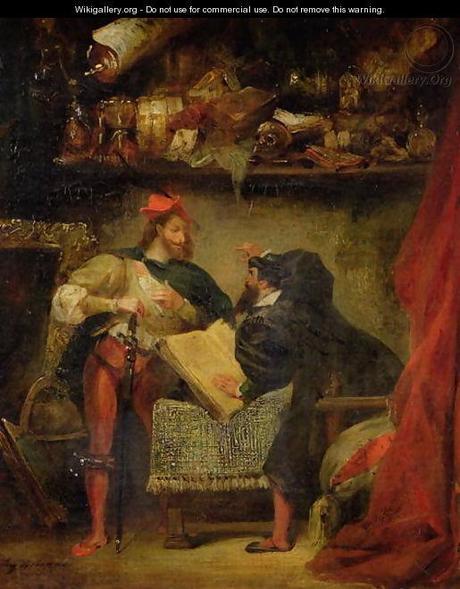"Die unbegreiflich hohen Werke / sind herrlich wie am ersten Tag." - Faust 249-250

Delacroix, "Mephistopheles devant Faust," 1826
Gounod's Faust was the first work performed at the Metropolitan Opera House, in 1883. The 1859 opera enjoyed an almost unrivaled popularity in the late nineteenth and early twentieth centuries; George Bernard Shaw famously complained that a professional critic in London had to spend approximately a decade of a twelve-year career listening to Faust, and that he himself had been nearly blinded by prolonged exposure to Mephistopheles' red spotlight (his full Faust-assessment can be found in this book.) In Gaston Leroux' Phantom of the Opera, Faust is the opera chosen to represent both vocal virtuosity and dangerous sensuality (a connection emphasized in this film adaptation.) In Jean Renoir's film about WWI, Grand Illusion, it is presented as plausible that "Anges Purs" would be known by every French officer. Critical interpretations of the opera often cluster around the question: how did Faust achieve such status?
Peter Conrad, in A Song of Love and Death, has called Faust the opera glorifying Mammon, proclaiming in savage triumph that the golden calf still stands. In this interpretation, petty bourgeois society provides the determining social framework--materially ambitious, hypocritically moralistic. In this interpretation, Faust's new identity as a voluptuary determines the character of the opera. Operatic Subjects, likewise, sees Mephistopheles as fully at home in the world which professes to scorn and fear him, "un vrai gentilhomme." Sandra Corse interprets the Church Scene as one in which the judgment of the clergy and society is filtered through Marguerite's disturbed psyche to appear before the audience as the gloating of the devil and his minions. (An intriguing idea indeed; not one that has been staged, as far as I know.) Steven Huebner, on the other hand (in The Operas of Charles Gounod) sees a contrast drawn between the intolerance of Valentin in judging Marguerite and the compassion of the bystanders.
Juergen Schlaeder notes that, in the years before 1830, Faust was appreciated in France as a complex and contradictory figure, a model for many who were, like the philosopher, determined to engage the world with received wisdom and personal experience, refusing indifference or blindness to the inner workings of society. Profound social and economic changes in the Second Empire, Schlaeder argues, were reflected in the mid-century interpretations of Faust which made Marguerite central to the story (in performance, the opera was often known as "Marguerite," and in Gounod's drama, she is the least static of the characters.) The rise of a bourgeoisie bolstered by a consumer culture that was encouraged from the top of the political hierarchy contributed to a dangerous blending of monde and demi-monde, with ambition and anxiety never far apart. David McVicar's smart, sexy production for the ROH (DVD) acknowledges this, and presents both Valentin's career as a soldier and his rage at Marguerite's 'transgression' as stemming from anxieties about the social body. Corinna Herr also takes up this theme, examining Gretchen/Marguerite as the femme faible counterpart to Medea; the eighteenth- and nineteenth-century fascination with these characters on the operatic stage, Herr argues, stemmed largely from the fact that both their acts of infanticide could be rationalized within the context of the drama, violently contradicting Rousseau's theory of "the nature of women."
So why is Faust back? The relevance of its critique of consumerism could hardly be more apparent, of course, and the tragedies of jingoism are also very much with us ("Gloire immortelle de nos aïeux.") But there remains what, in German, is still called the Gretchenfrage: what about religion? An article in the November issue of Opera News asks plaintively what twenty-first century audiences are to make of Faust, when sin and salvation are, for a majority of the audience, assumed not to be a priority or preoccupation? Goethe asked nearly the same question. When a witch calls Mephistopheles Satan, he rebukes her: "That name was consigned to books of fairy tales long ago. But," he adds, "it didn't do humanity any good. They've freed themselves of the Evil One, but evil still is with them." (My own prose translation.) Surely that problem is still very much with us. Des McAnuff's Faust, in figuring the (anti-)hero as involved with the creation of the atom bomb, seems to me a promising concept. As Faust says in his opening monolog (my translation again): "So yes, I am wiser than all these vain men--doctors, professors, clerks and priests--and plagued by no doubts or scruples, fearing neither hell nor the Devil. But I have lost all joy; I harbor no delusions that I know what's right, or that I could teach anything that could convert people, or improve their lot." ...Damn. How this existential despair will sit with Gounod's music is another question, and reviews from the production's run at ENO tended to the conclusion that it didn't do so very well. But I'm trying to keep an open mind as I look forward to Tuesday: Gounod's Faust, starring a Goethe-quoting tenor.

